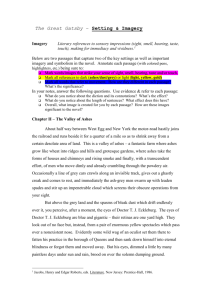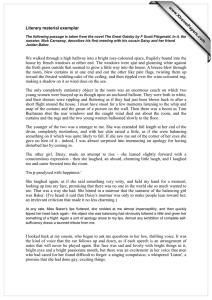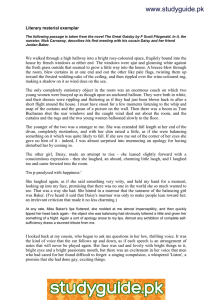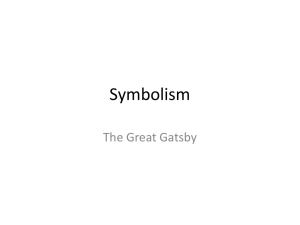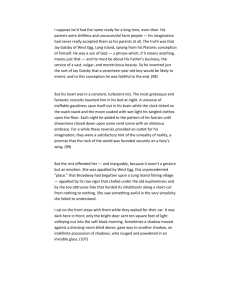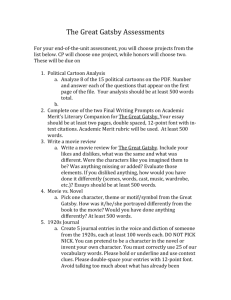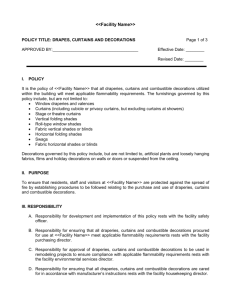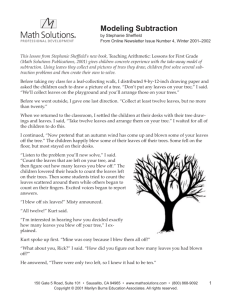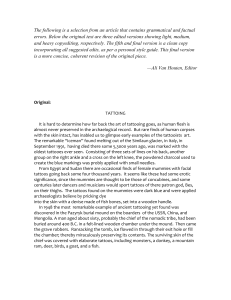Style
advertisement
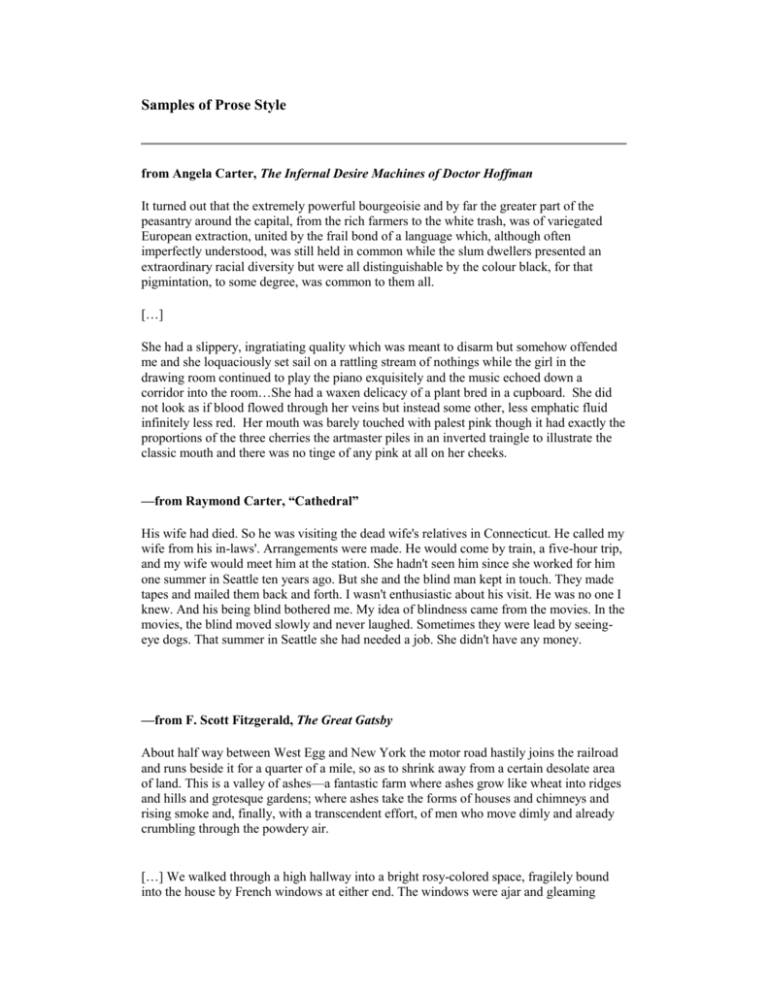
Samples of Prose Style from Angela Carter, The Infernal Desire Machines of Doctor Hoffman It turned out that the extremely powerful bourgeoisie and by far the greater part of the peasantry around the capital, from the rich farmers to the white trash, was of variegated European extraction, united by the frail bond of a language which, although often imperfectly understood, was still held in common while the slum dwellers presented an extraordinary racial diversity but were all distinguishable by the colour black, for that pigmintation, to some degree, was common to them all. […] She had a slippery, ingratiating quality which was meant to disarm but somehow offended me and she loquaciously set sail on a rattling stream of nothings while the girl in the drawing room continued to play the piano exquisitely and the music echoed down a corridor into the room…She had a waxen delicacy of a plant bred in a cupboard. She did not look as if blood flowed through her veins but instead some other, less emphatic fluid infinitely less red. Her mouth was barely touched with palest pink though it had exactly the proportions of the three cherries the artmaster piles in an inverted traingle to illustrate the classic mouth and there was no tinge of any pink at all on her cheeks. —from Raymond Carter, “Cathedral” His wife had died. So he was visiting the dead wife's relatives in Connecticut. He called my wife from his in-laws'. Arrangements were made. He would come by train, a five-hour trip, and my wife would meet him at the station. She hadn't seen him since she worked for him one summer in Seattle ten years ago. But she and the blind man kept in touch. They made tapes and mailed them back and forth. I wasn't enthusiastic about his visit. He was no one I knew. And his being blind bothered me. My idea of blindness came from the movies. In the movies, the blind moved slowly and never laughed. Sometimes they were lead by seeingeye dogs. That summer in Seattle she had needed a job. She didn't have any money. —from F. Scott Fitzgerald, The Great Gatsby About half way between West Egg and New York the motor road hastily joins the railroad and runs beside it for a quarter of a mile, so as to shrink away from a certain desolate area of land. This is a valley of ashes—a fantastic farm where ashes grow like wheat into ridges and hills and grotesque gardens; where ashes take the forms of houses and chimneys and rising smoke and, finally, with a transcendent effort, of men who move dimly and already crumbling through the powdery air. […] We walked through a high hallway into a bright rosy-colored space, fragilely bound into the house by French windows at either end. The windows were ajar and gleaming white against the fresh grass outside that seemed to grow a little way into the house. A breeze blew through the room, blew curtains in at one end and out the other like pale flags, twisting them up toward the frosted wedding-cake of the ceiling, and then rippled over the wine-colored rug, making a shadow on it as wind does on the sea. The only completely stationary object in the room was an enormous couch on which two young women were buoyed up as though upon an anchored balloon. They were both in white, and their dresses were rippling and fluttering as if they had just been blown back in after a short flight around the house. I must have stood for a few moments listening to the whip and snap of the curtains and the groan of a picture on the wall, Then there was a boom as Tom Buchanan shut the rear windows and the caught wind died out about the room, and the curtains and the rugs and the two young women ballooned slowly to the floor. […]When they met again, two days later, it was Gatsby who was breathless, who was, somehow, betrayed. Her porch was bright with the bought luxury of star-shine; the wicker of the settee squeaked fashionably as she turned toward him and he kissed her curious and lovely mouth. She had caught a cold, and it made her voice huskier and more charming than ever, and Gatsby was overwhelmingly aware of the youth and mystery that wealth imprisons and preserves, of the freshness of many clothes, and of Daisy, gleaming like silver, safe and proud above the hot struggles of the poor. […]Already it was deep summer on roadhouse roofs and in front of wayside garages, where new red gas-pumps sat out in pools of light, and when I reached my estate at West Egg I ran the car under its shed and sat for a while on an abandoned grass roller in the yard. The wind had blown off, leaving a loud, bright night, with wings beating in the trees and a persistent organ sound as the full bellows of the earth blew the frogs full of life. The silhouette of a moving cat wavered across the moonlight, and turning my head to watch it, I saw that I was not alone—fifty feet away a figure had emerged from the shadow of my neighbor's mansion and was standing with his hands in his pockets regarding the silver pepper of the stars. —from Annie Proulx, CloseRange: Wyoming Stories In the first go-round he'd drawn a bull he knew and got a good scald on him. He'd been in a slump for weeks, wire stretched right, but things were turning back his way. He'd come off that animal in a flying dismount, sparked a little clapping that quickly died; the watchers knew as well as he that if he burst into flames and sang an operatic aria after the whistle it would make no damn difference. He drew o.k. bulls and rode them in the next rounds, scores in the high seventies, fixed his eyes on the outside shoulder of the welly bull that tried to drop him, then at the short-go draw he pulled Kisses, rank and salty, big as a boxcar of coal. On that one all you could do was your best and hope for a little sweet luck; if you got the luck he was money. […] What he wanted to know now, tires spanking the tar-filled road cracks and potholes, funeral homburg sliding on the back-seat, was if Rollo had got the girlfriend away from the old man, thrown a saddle on her and ridden off into the sunset?...His thoughts clogged as if a comb working through his mind had stuck against a snarl. […] 2 They climbed through the stony landscape, limestone beds eroded by wind into fantastic furniture, stale gnawed breadcrusts, tumbled bones, stacks of dirty folded blankets, bleached crab claws and dog teeth. […] The roots of his mind felt withered and punky. […] […] Looking at her, not just her face, but up and down, eyes moving over her like an iron over a shirt and the old man in his mailman’s sweater and lopsided hat tasting his Everclear and not noticing or not caring, getting up every now and then to lurch onto the porch and water the weeds. […] He traveled against curdled sky. In the last sixty miles the snow began again. He climbed out of Buffalo. Pallid flakes as distant from each other as galaxies flew past, then more and in ten minutes he was crawling at twenty miles an hour, the windshield wipers thumping like a stick dragged down the stairs. The light was falling out of the day when he reached the pass, the blunt mountains lost in snow, the greasy hairpin turns ahead. He drove slowly and steadily in a low gear; he had not forgotten how to drive a winter mountain. But the wind was up again, rocking and slapping the car, blotting out all but whipping snow and he was sweating with the anxiety of keeping to the road, dizzy with altitude. Twelve more miles, sliding and buffeted, before he reached Ten Sleep where streetlights glowed in revolving circles like Van Gogh's sun. —from Mark Leyner, Et Tu, Babe The giant awoke, got high on drugs, masturbated, and then went into town to forage for a human-flesh breakfast. He stopped at an intersection where his eye was caught by the puffy orange Day-Glo parka of a postmenopausal crossing guard. He knelt down and plucked up the screaming crossing guard in his fingers and dropped her into a gunnysack slung across his back. […] Those were my first visceral tattoos. I’ve had many since. A tip to the guys out there— visceral tattoos really turn on female medical technicians and nurses. I’ve had numerous hot relationships start because a med-tech or a nurse saw one of my X-rays and went nuts over all the tattoos. They know that any wimp can go out and get “Winona Forever” stenciled on his arm—but it takes real balls to have yourself put under general anesthesia, sliced open, have a vital organ etched with radioactive isotope ink, and then get sewn up again every time you want to commemorate that special lady. Next, I want to have the words Desert Storm—Thunder and Lightning tattooed on my left frontal cortex. But I don’t know where I’m going to go for that one. Brain tattooing is illegal even in Mexico. Someone told me maybe Malaysia. […] Rocco’s father had been a medical cheese sculptor—he sculpted cheese centerpieces for medical conventions. It was a profession that required not only fine craftsmanship and an 3 encyclopedic knowledge of cheeses, but a comprehensive understanding of human anatomy. One needed to know which cheeses by dint of their hues and textures would allow the sculptor to render an organ with maximum fidelity. Mavarti with dill, for instance, is particularly suitable for sculpting uterine lining. Mozzarella has just the right slickness and convoluted folds for the brain.” […] When I arrive at the Jack LaLanne Health Spa, there is no sign that a clandestine meeting of ultra-right-wing intellectuals and psychics is taking place in its sauna. Yelping aerobics classes, the echo of racquetballs, sweaty florid-faced hausfraus in garish leotards slumped at juice machines, men with hairy jiggling breasts and gelatinous rolls of stretch-marked belly fat grimly tramping on treadmills and Stairmasters—nothing out of the ordinary. I undress in the locker room, walk down a short hallway, come to a door marked SAUNA and open it. Through the thick steam, the first face I recognize is that of Dr. Claude Lorphelin, a gynecologist, surrealist poet, and neo-fascist pamphleteer who lives in the post 16th Arrondissement of the Paris, France simulation at EpotCenter. —from Lorrie Moore, "How to Talk to Your Mother" Once in a while take evening trips past the old unsold house you grew up in, that haunted rural crossroads two hours from where you now live. It is like Halloween: the raked, moonlit lawn, the mammoth, tumid trees, arms and fingers raised into the starless wipe of sky like burns, cracks, map rivers. . .Look up through the windshield. In the November sky a wedge of wrens moves south, the lines of their formation, the very sides and vertices mysteriously choreographed, shifting, flowing, crossing like a skater's legs... Walk through wooded areas; there is a life there you have forgotten. The smells and sounds seem sudden, unchanged, exact, the paper crunch of the leaves, the mouldering sachet of the mud. The trees are crooked as backs, the fence posts splintered, trusting and precarious in their solid grasp of arms, the asters splindly, dry, white, havishammed (Havishammed!) by frost. —from Lorrie Moore, a selection of sentences with interesting figurative language 1. 2. 3. 4. 5. 6. 7. 8. 9. "Her eyebrows will lift like theater curtains." "Your roommate looks at you, her face blank as a large Kleenex." "Work up a vibrato you could drive a truck though." "Try to figure out what has made your life go wrong. It is like trying to figure out what is stinking up the refrigerator. " "You are a zoo of insecurities." "The clink of the silverware inside the drawer, piled like bones in a mass grave." "You see a ghost, something like a spinning statue by a shrub." "She ages, rocks in your rocker, noiseless as wind." "On public transportation mothers with soft, soapy, corduroyed seraphs glance at you, their faces dominoes of compassion." 4
